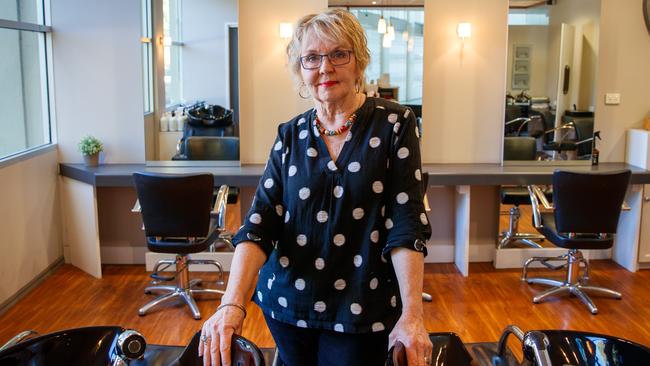New anti-virus measures restrict hairdresser appointments to 30 minutes, and funerals to 10 people
From Thursday, hairdressers and funerals will both look very different for a few months. For some the changes are too much, and they’re closing entirely.
SA News
Don't miss out on the headlines from SA News. Followed categories will be added to My News.
Hundreds of businesses are grappling with changes that have forced heavy restrictions on everything from getting your hair cut to attending a funeral, as the COVID-19 pandemic continues.
Among the new rules introduced from today, hairdressers and barbers will be restricted to 30-minute appointments, while beauty and nail salons will close, along with tattoo shops.
Families are also banned from having more than 10 people attending funeral services to prevent the virus’ spread in a seismic shift for a time-honoured tradition where a comforting hug can make all the difference for a distraught relative.
SA Hair & Beauty Association president Rose Bradshaw said at least 15,000 people were employed in the industries across the state, and thousands of jobs would be affected.
While the decision to close beauty businesses is mandatory, many hair salons had also closed because of health concerns, or where owners had deemed it was no longer profitable.
“From a business perspective, it doesn’t impact on barbers because they’re mainly cutting and it’s highly likely that they can complete a service in 30 minutes,” Ms Bradshaw said.
“But for hairdressing, it’s impossible – even a shampoo and blow wave would be pretty difficult.
“We’re being inundated with our members saying ‘What are we supposed to do, how can this work?’”
Tricia Hicks, who owns Hair Artistique at Next Generation in the city, decided to close her salon indefinitely at the weekend because of the health impacts for clients and staff.
“Our clients have been amazing – they’ve said to me, ‘I was wondering why this hadn’t happened before’.
“We were sitting our clients in every second seat and had no magazines, but at the end of the day when you have your hair cut the hairdresser is sitting right next to you for an hour or an hour and a half.

“I just said I couldn’t live with myself if one of my staff or clients got infected by the virus.”
Mrs Hicks will keep all of her staff on the books and expects them to be well supported by Government-introduced wage subsidies.
Meantime, funeral service providers are having to rapidly transform their businesses by webcasting or broadcasting funerals and suggesting families hold private burials or cremations and delay memorial services until the COVID-19 pandemic abates.
Michael Butler, managing director of Klemzig-based Ivan Butler Funerals said families would have to make tough decisions about who could attend services.
“Funerals are going to become very different for some time,” he said.
He said the capacity restrictions would have flow-on impacts to funeral suppliers such as florists, printers, and limousine drivers.
Enfield Memorial Park, which is operated by the Adelaide Cemeteries Authority, this week introduced free live streaming of services from its chapels.
“We realise that this is not ideal, but it is the best option available under current restrictions,” ACA chief executive Robert Pitt said, adding the broadcast can be watched at any time.
Harrison Funerals administrator Raelene Nicholls said the company, which holds 650 funerals a year at its chapels at Ridgehaven and Queenstown, yesterday had someone cancel an upcoming funeral and has been “frantically” trying to help families.
She said they had already experienced a drop in the number of people attending funerals because of the virus pandemic.
“The majority of people attending funerals are older, therefore they are more compromised,” she said.
Weddings are also restricted to only five people – the marrying couple, two witnesses and a celebrant.
Association of Civil Marriage Celebrants of SA secretary Pamela Schultz said most people were postponing their ceremonies, impacting on the state’s 580 celebrants – though from April, work would usually wind down until Spring.
A small number were choosing to go ahead with ceremonies and put off their receptions until they could celebrate with family and friends.
